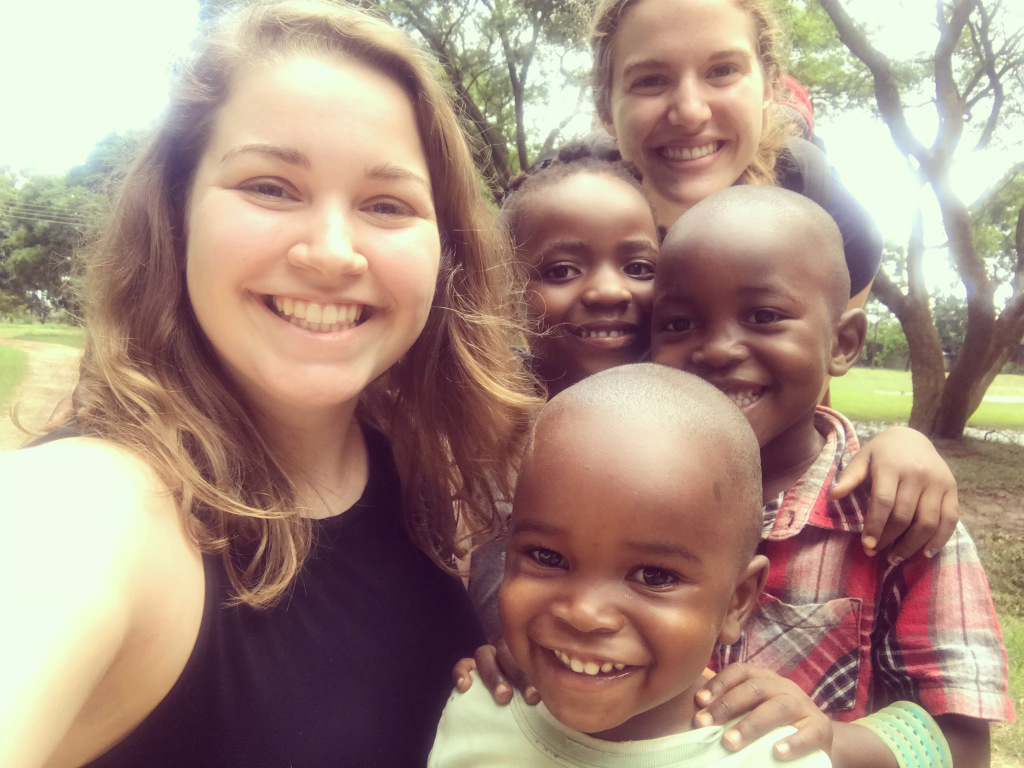Now I Believe
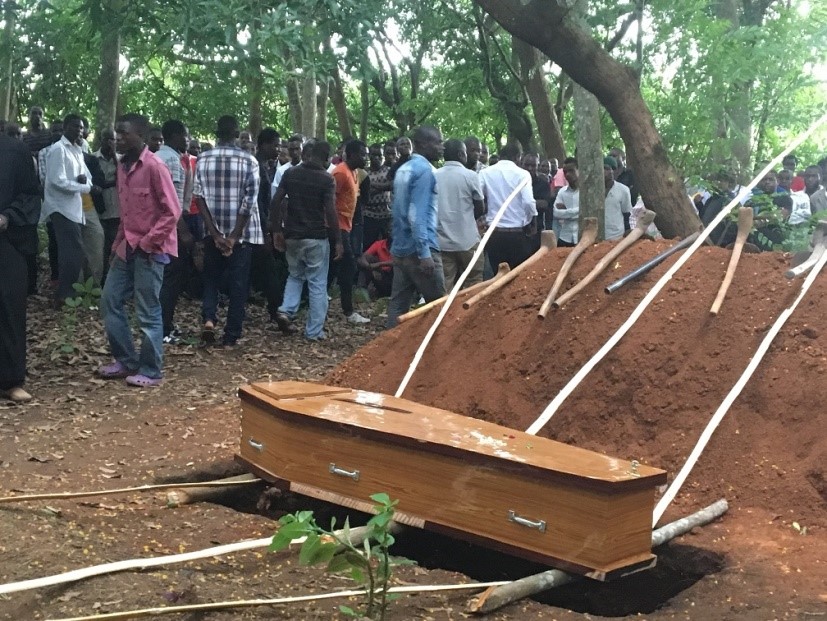
I didn’t know what he meant.
I heard his words but I didn’t grasp his message. I wondered what he was really saying. What was the meaning behind the words? Was he even talking to me? Or to someone else? Or was he just talking to himself? Three times he repeated the same thing:
“Now I believe.”
I was a bit uncertain about his words because I had just walked up to him. His name is Bright Pembeleka. He is the pastor of Beautiful Savior Lutheran Church in Blantyre, Malawi. He’s been serving in the public ministry for 13 years.
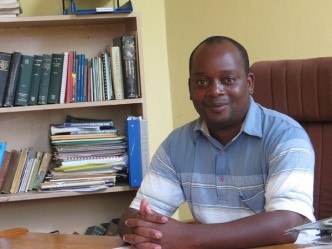
We both had come to the same place: the mortuary. We were collecting the body of a Lutheran Church member. Pastor Pembeleka has been there before. Many times.
As a pastor he knows the routine all too well when someone dies: visiting the family, preparing the sermon, leading the worship, saying the prayers, conducting the burial service. But this time was different. Powerfully different. Life-changingly different.
This time he would not wear the robe of a preacher but the cloak of grief. The Lutheran member who passed away wasn’t just a church member, the person was his own daughter. Edina was twenty-one years old. Just… twenty-one!
It’s not supposed to happen this way! But it did.
Watching one coffin after another being carried out of the mortuary and being placed into waiting vehicles reminded me once again: The old must die. The young can.
We waited while the embalmers did their job. Sensing an opening in the conversation, I risked asking Pastor Pembeleka what he meant by what he said, “Now I believe.” His explanation came freely though heavily; it didn’t just land in my ears it settled in my heart:
I have officiated at a lot of funerals. I did so because it was my job. It was part of my work. But now it is happening to me. Now is really the first time I know what it means to grieve. Now I am the one experiencing the pain. Now I know the heart-ache that others have talked about.
Now. I. FEEL.”
His eyes were reddening with tears. His voice was cracking with sorrow. His heart was breaking with pain. The cloak he wore was both dark and heavy.
Now I believe.
Grief seized him and gripped him. He and his wife and children would now be the ones to weakly stand, then kneel beside the pile of fresh dirt. Even fall upon it.
Maybe you’ve been there. Waiting at the mortuary. Visiting at the funeral home. Walking the path to the grave. Placing a wreath of flowers. If so, you understand. If not, you likely will. Because sooner or later death touches the ones we love.
The cloak is dark and heavy.
Pastor Pembeleka would be at the funeral, but this time he wouldn’t be leading the service. Others would: His brothers in Christ. Fellow servants. Seasoned preachers. A band of disciples who gathered, supported, encouraged, prayed and rallied around their grieving brother and family.
Some of whom have buried their own children. They know. They have experienced. They understand. They FEEL. They believe.
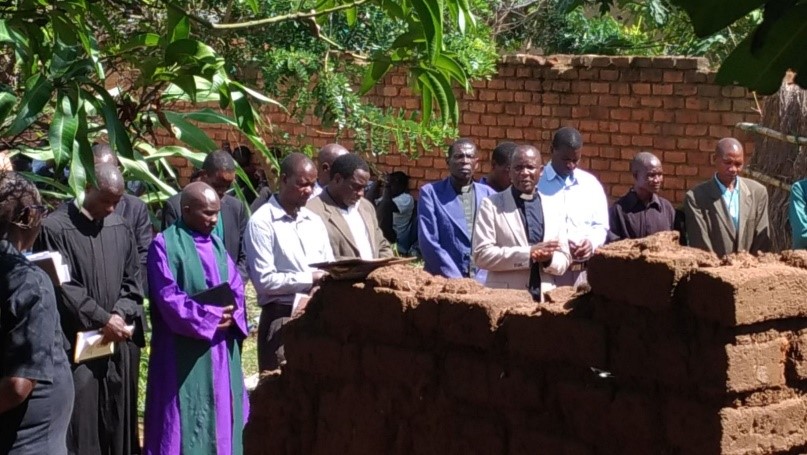
They gave what they had and what they had was what was needed most: the Word of God. After all, it had something to say to Pastor Pembeleka, his wife, his children3 and everyone there. It has something to say to you who weren’t: At a Christian funeral, GRIEF isn’t the only cloak worn on such days! So is the robe righteousness. The mantle of God’s grace. God has draped his people with a love that seizes and grips and doesn’t let go.
In death there is life! (John 11:25, 26)
Most fittingly, Pastor Eliya Petro chose and preached on the assuring words found in John’s first letter: ”God has given us eternal life, and this life is in his Son. He who has the Son has life…” (1 John 5:11, 12) Edina has life because the Son has her!
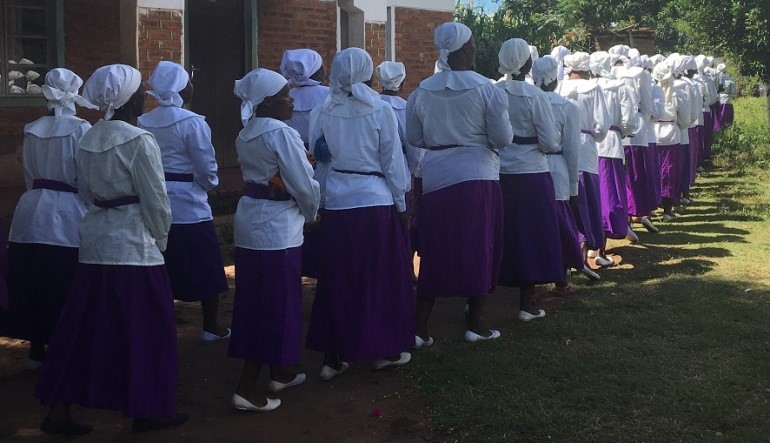
A chorus of Lutheran women, uniformed in purple and white, confidently sang that truth again and again as they walked in a long double line to the funeral house, “She’s in the hands of God, yes, she’s in the hands of God.”
She is… because Jesus has conquered death!
She is… because Jesus lives!
She is… because Jesus has taken away her sin!
Pastor Pembeleka, you and your brothers have taught your congregations well. The people, whether sitting in the pew at church or sitting on the ground in a graveyard or kneeling close to the pile of dirt, have heard the life-giving gospel of Jesus Christ from you. Week after week. Sermon after sermon. Service after service. Funeral after funeral. Look around, dear brother. The gospel has done miraculous and marvelous things!
The people are expressing the very faith that God has given them. They are sharing the good and comforting news of Jesus with you and your family when you are the one grieving, the one paining, the one sorrowing, the one experiencing. They are serving you, standing with you when you are the one feeling.
Thank you, Pastor, for showing your humanness. Your frailty. Your need. Thank you for sharing your pain and your sorrow and your tears. When we are weak, then we are strong. (2 Corinthians 12:10)
Now I believe.
In my weakness and God’s strength,
Missionary John Holtz, Malawi
Please pray for those working in fields that are ripe for harvest. Share their story, engage with future news and receive updates. Go to this link to learn more about our mission fields in Africa and how the Holy Spirit is working faith in people’s hearts https://wels.net/serving-others/missions/africa
[youtube https://www.youtube.com/watch?v=Bia-vt_kjWQ?feature=oembed&w=525&h=295]
[youtube https://www.youtube.com/watch?v=Bia-vt_kjWQ]
[youtube https://www.youtube.com/watch?v=ZAPgYjhGxE0?feature=oembed&w=525&h=295]
[youtube https://www.youtube.com/watch?v=ZAPgYjhGxE0]
[youtube https://www.youtube.com/watch?v=zedeJhBrg0I?feature=oembed&w=525&h=295]
[youtube https://www.youtube.com/watch?v=zedeJhBrg0I]
